%20Black%20Ticket%20Films.jpg)
Behind ‘Writing with Fire’: three women and their thirst for truth in Oscar 2022 entry
As ‘Writing with Fire’ competes at the Oscars, filmmakers Rintu Thomas and Sushmit Ghosh look back on why they decided to follow three Dalit journalists for five years
As ‘Writing with Fire’ competes at the Oscars, filmmakers Rintu Thomas and Sushmit Ghosh look back on why they decided to follow three Dalit journalists for five years
Six years ago, when New Delhi-based filmmakers Rintu Thomas and Sushmit Ghosh attended a meeting at the Khabar Lahariya office in Chitrakoot, Uttar Pradesh, they had no idea how deeply engaged they would soon get with the lives and work of the women journalists there.
And they definitely wouldn’t have guessed that the narrative they were about to weave into a documentary would one day premiere at the Sundance Film Festival, where it would win two awards — followed by similar accolades at several other festivals — and eventually receive an Oscar nomination in the Best Documentary category. It is a first for a feature length documentary produced and directed by Indian filmmakers.

Rintu Thomas and Sushmit Ghosh
| Photo Credit: Special arrangement
Thomas and Ghosh’s film, Writing with Fire, is the remarkable story of Khabar Lahariya (Waves of News), the only Indian media organisation run by Dalit women — operating in small towns and rural areas of the Hindi belt, where patriarchy rules — as they attempt to move from print to digital journalism. Shot over five years, it is a story of determined journalists, some mothers and others single, and their commitment to press freedom.
“Journalism is the essence of democracy,” Meera Devi, one of the protagonists in the film, says. She is also the first Khabar Lahariya journalist whom Thomas, 35, and Ghosh, 39, were drawn to, when they observed the women at the meeting six years ago. “When citizens demand their rights, it is us journalists who can take their demands to the government. The journalists must use this power responsibly. Otherwise, media will become like any other business.”
As you watch the film, you realise Meera and her colleagues never back away from a story, not even when it entails investigating a project like 2014’s Swachh Bharat Mission, which promised every household in the country access to a toilet. While one woman they interview reveals the shame of still having to relieve herself outside, another calls the declaration made in 2019 — that rural India is open defecation free — “not true”.
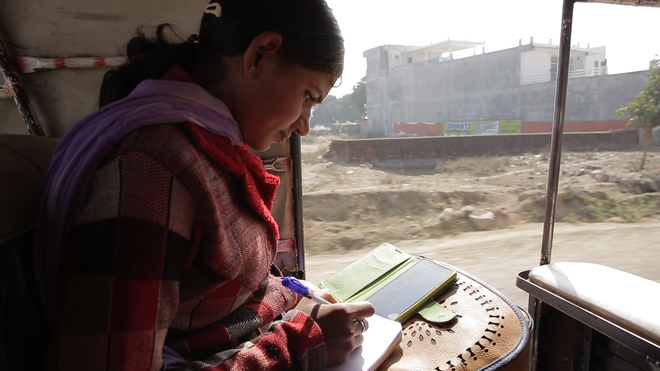
Suneeta Prajapati
| Photo Credit: Black Ticket Films
This is not a victim story
Meera is a natural leader, Thomas says. She and Ghosh were also fascinated by the energy of Suneeta Prajapati, who is in love with print and reluctant to switch to digital. A former child miner turned reporter, she questions everything and does not take anything at face value. Shyamkali Devi, a domestic-abuse survivor, is the third journalist they focus on — a timid woman who is much quieter than her peers.
After a week at the Khabar Lahariya office, the director duo recalls the women being curious about how long they would be filmed and what the story would be. “We knew immediately this won’t be a short film as the story needed more time to marinate,” says Ghosh. “So, we told them this could take a couple of years.”
Thomas adds: “We also knew this won’t be a victim story or about women empowerment — the kind of super heroine story because that dehumanises people. We told Meera, Suneeta and Shyamkali that our film would focus on them, who they were, and their spirit.”
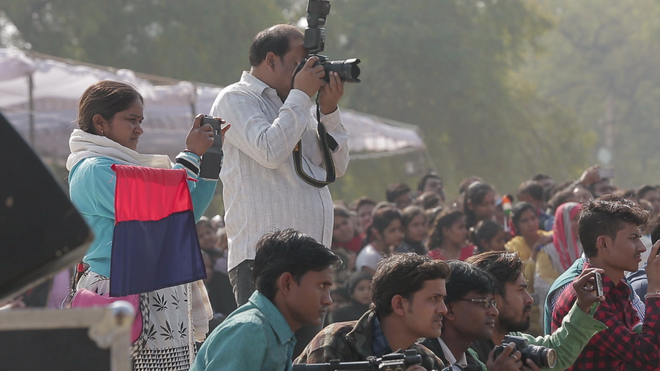
Meera in the field
| Photo Credit: Black Ticket Films
Their spirits cannot be cowed
Writing with Fire follows the three women as they first learn, and then train their teammates on going digital — scenes show them struggling to operate the video cameras on their new smartphones, and to edit. The film tracks them juggling domestic responsibilities and pressures, while commuting long distances to cover reports about illegal mining, rapes, murders, and interviewing police officers and politicians when Uttar Pradesh went to the polls in 2017.
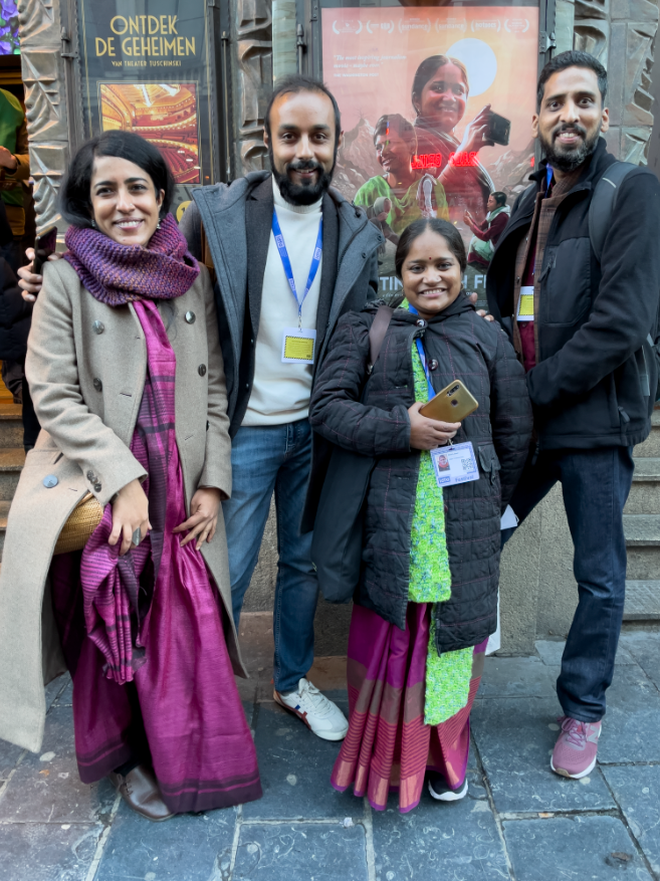
The Writing with Fire team and Meera in Amsterdam
| Photo Credit: Black Ticket Films
The women have grown up experiencing violence and discrimination because of who they are. When they report in the field, they mostly meet upper-caste men, who appear to tolerate them. But they often face real hostility. “You should speak within your limits,” one of the upper-caste man says in the film. Harassing phone calls that the women get also pepper the narrative, reminding viewers of the dangers they face on the job.
You would think that the presence of filmmakers from the city would make a difference, but that was not the case. “At the IDFA [International Documentary Film Festival Amsterdam] screening, Meera was asked by the audience if our presence emboldened them. And she said, ‘In the first year, I was really scared for these three [the filmmakers and cinematographer Karan Thapliyal] because we aren’t used to city people coming into illegal mines or police stations’,” Ghosh says.
Thomas adds, “We were city kids, so to speak. We would stand out. Most people over there eventually knew that a film was being made on Khabar Lahariya. And they often wondered, ‘But why?’ A lot of times, the politicians or police officers would say, ‘Oh, you guys are back?’”
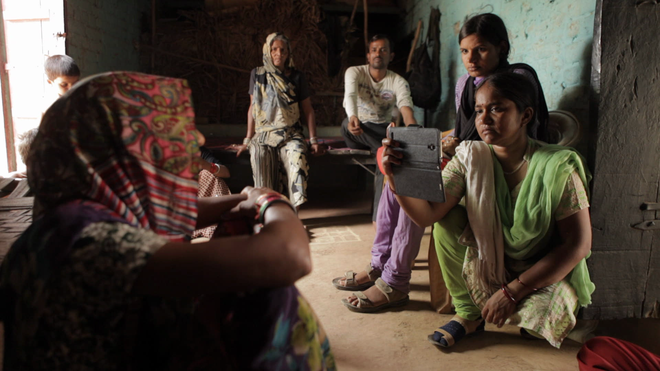
Meera Devi
| Photo Credit: Black Ticket Films
Now to catch the Academy’s eye
As the filmmakers worked on the film, raising funds and doing the post-production, they were clear about one thing — they wanted the main producer credit to be with them, to ensure they ‘owned’ the film, and could make editorial decisions about what the story was going to be.
“What does India look and feel like, that question often comes up in the West,” Ghosh says. “Our response is, we have our problems, but we have this beautiful sort of legacy as well. This is the best of what India has to offer. It was important for us to restructure and rewire how the West thinks about what the Global South can do and can imagine. I think the fact that we made the Oscar nomination has broken so many paradigms about who can do an Academy run, because it’s never happened before.”
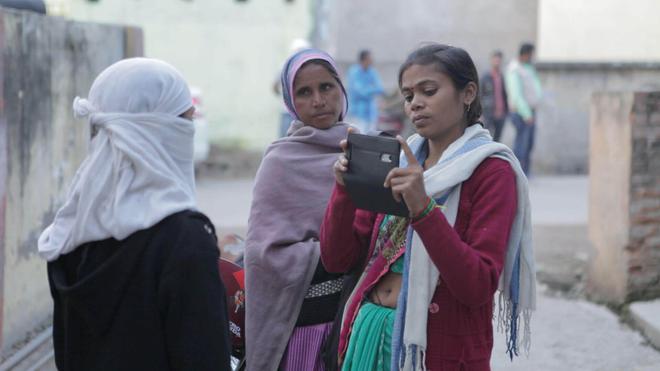
Shyamkali Devi
| Photo Credit: Black Ticket Films
For the post-nomination promotional campaign, the filmmakers have engaged a US-based publicist, as several films seek to catch the limited attention span of the Academy members. What was perhaps a small initial budget to cover the shoot in Uttar Pradesh, and post-production work in Manali, would have increased substantially during the last phase of promotions leading up to the Oscar ceremony on March 27. (The filmmakers, however, did not want to put out a number.)
Along the way, to build up momentum for Writing with Fire, they also sought help from a few well-known names that would give the project greater exposure in the international festivals and awards circuits. One such person — who came on board as the film’s executive producer — is Patty Quillin. She has lent her name to projects such as the celebrated documentary The Truffle Hunter (2020) and the feature film Mogul Mowgli (2020), starring Riz Ahmed. Quillin is married to Reed Hastings, founder and CEO of Netflix, but it is a profile she does not like to brag about.
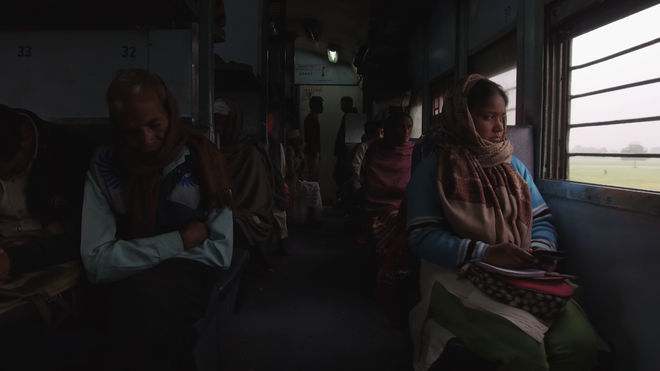
Meera travelling for a story
| Photo Credit: Black Ticket Films
When can we watch it?
In the post-Oscar scenario, the filmmakers hope to share the film with audiences in India. But they don’t have clarity yet — it will be a tough road for Writing with Fire, given that there isn’t much of a tradition of documentaries getting theatrical releases. “We don’t have any distribution offers from streamers in India yet,” says Ghosh.
“Patty distances herself like the plague from the Netflix conversation. That’s the trap she also falls into,” Thomas says. “She said to us, ‘I really believe in what you are going to do with the film and I trust you.’ And that’s it. It was great to have someone like that who is invested in the film and the process.”
Now as Thomas and Ghosh prepare to attend the Academy Awards ceremony in Los Angeles, they are hoping they can take Meera with them. “It would be something to have her walk the red carpet,” says Thomas. “That would be a statement.”
Stay connected with us on social media platform for instant update click here to join our Twitter, & Facebook
We are now on Telegram. Click here to join our channel (@TechiUpdate) and stay updated with the latest Technology headlines.
For all the latest Entertainment News Click Here
For the latest news and updates, follow us on Google News.

